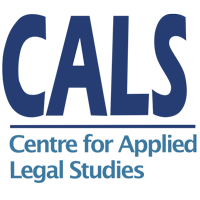About us
The Centre for Applied Legal Studies was founded in 1978 by Professor John Dugard as a legal research unit within Wits University. The purpose of the Centre was to encourage law reform and improve access to justice during apartheid. While much has changed over the years since then, our organisation remains committed to promoting human rights and challenging systems of power in South Africa and the region.
Our vision is a society where historical and social justice are achieved, state institutions are strengthened and powerful entities are held to account by marginalised actors. In working towards this vision, we are guided by four key pillars, namely:
- Expanding the agency of marginalised actors – We recognise that in pursuing a truly equal society, it is not enough simply for civil society organisations to hold powerful entities responsible for rights abuses. We must instead ensure that the people experiencing the violations are placed at the centre of these efforts and are able to vindicate their rights themselves.
- Developing a critical partnership with the state – It is our view that a well-run and accountable state is essential to addressing injustice. We see our role as that of a partner which engages with and helps to capacitate the state in order to realise the promise of the Constitution, but is not uncritical when the state fails in its duties.
- Ensuring horizontal application of the Constitution – While much social justice work focuses on the state’s constitutional obligations, many private corporations are large and powerful enough to have a serious impact on human rights. South Africa’s Constitution offers a unique opportunity to address this situation, since it binds both public and private entities.
- Taking an intersectional and gendered approach to human rights violations – We appreciate that rights violations do not generally occur in isolation, but rather intersect. These violations also often have a disproportionate impact on particular groups who are already rendered vulnerable, such as women and people with disabilities.
We work towards our vision by undertaking research, advocacy and strategic litigation organised according to our five intersecting programmes, namely: Business & Human Rights; Civil & Political Justice; Environmental Justice; Gender Justice and Home, Land & Rural Democracy.


